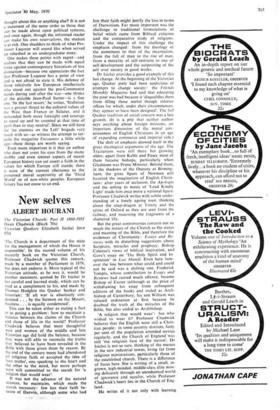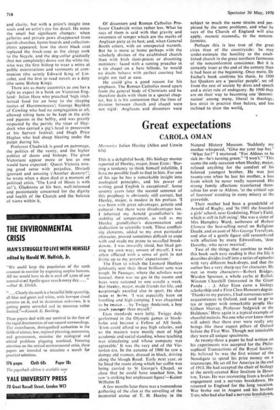New selves
ALBERT HOURANI
The Victorian Church: Part II 1860-1901 Owen Chadwick (Black 70s) Victorian Quakers Elizabeth Isichei (ouP 65s) 'The Church is a department of the state for the management of which the House is responsible'. In the second volume of his masterly book on the Victorian Church, Professor Chadwick quotes this remark, made by a member of Parliament in 1878, but does not endorse it. More typical of the Victorian attitude, as he sees it, would be another statement, quoted by Dr Isichei in her careful and learned study, which can be read as a complement to his, and made by Thomas Hodgkin the Quaker banker and historian: 'If all war is absolutely con- demned . . . by the Sermon on the Mount, business ... is equally condemned'.
This can be taken either as stating a fact or as posing a problem: how to maintain a balance between the claims of the Church and those of life in the world? Professor Chadwick believes that most thoughtful men and women of the middle and late Victorian age did hold the balance, because they were still able to reconcile the truths they believed to have been revealed in the Bible with those given them by reason. By the end of the century many had abandoned all religious faith or accepted the idea of two truths', one speaking to the heart and the other to the mind, but more perhaps Were still committed to the search for 'a religion that would wear'.
It was not the advance of the natural sciences, he maintains, which made the search necessary : few lost their faith be- cause of Darwin, although some who had lost their faith might justify the loss in terms of Darwinism. Far more important was the challenge to traditional formulations of belief which came from Biblical criticism and the comparative study of religions.
Under the impact of this challenge the emphasis changed: from the theology of the atonement to that of the incarnation, from the fall of man to the rise of man, from a morality of self-restraint to one of self-development and the outpouring of the self over society in good works.
Dr Isichei provides a good example of this last change. At the beginning of the Victorian age, Quaker piety had been suspicious of attempts to change society: the Friends Monthly Magazine had said that educating the poor was bad because it 'disqualifies them from filling those useful though inferior offices for which, under their circumstances, they appear to have been designed'. The full Quaker tradition of social concern was a late growth. (It is a pity that neither author says anything about foreign missions, an important dimension of the moral con- sciousness of English Christians in an age of expanding commerce and imperial rule.) The shift of emphasis showed itself in the great theological arguments of the age. The Tractarians were still there but growing older; apart from Keble and Pusey most of them became bishops, particularly when Gladstone was Prime Minister. Behind them, in the shadows of the Oratory at Birming- ham, the great figure of Newman still haunted the imagination of English Christ. ians: after years of seclusion, the Apologia and the setting to music of 'Lead Kindly Light' made him once more a national figure. Professor Chadwick writes with subtle under- standing of a lonely ageing man, thinking about the snap-dragon at Trinity and the spires of Oxford as they are seen from the railway, and mourning the fragments of a shattered life.
But the great controversies concern not so much the nature of the Church as the status and meaning of the Bible, and therefore the evidences of Christianity : Essays and Re- views with its disturbing suggestions about Scripture, miracles and prophecy, Bishop Colenso's views of biblical inspiration, and Gore's essay on 'The Holy Spirit and In- spiration' in Lux Mundi. Even here how- ever the line between what could and could not be said was a shifting one. Frederick Temple, whose contribution to Essays and Reviews had caused much offence, became Bishop of Exeter (although at the price of withdrawing his essay from subsequent editions of the book) and ended as Arch- bishop of Canterbury; his son William was refused ordination at first because he doubted the truth of the miracles of the Bible, but also ended as Archbishop.
'A religion that would wear': but who wished to wear it? Professor Chadwick believes that the English were still a Chris- tian people: in some country districts, forty per cent of the population attended service regularly, and the Church of England was still 'the religious face of the nation'. Dr Isichei is not so sure, thinking of the masses in the new industrial towns, living far from religious ministrations, particularly those of the established church. There is a difference of focus here. She is writing of a small, in- grown, high-minded, middle-class elite mov- ing delicately through an unredeemed world of ignorance and squalor, while Professor Chadwick's heart lies in the Church of Eng- land.
He writes of it not only with learning
and clarity, but with a priest's insight into souls and an artist's eye for detail. He notes the small but significant changes: when galleries and private pews disappeared from parish churches, hymn-boards and collection- plates appeared; how the short black coat replaced the frock-coat as the clergy took to the bicycle, and the dog-collar gradually (but not completely) drove out the white tie; who was the first bishop to wear a mitre at public ministrations and vestments at com- munion (the saintly Edward King of Lin- coln), and the first to read novels as a duty (the same Bishop King).
There are as many eccentrics as one has a right to expect in a book on Victorian Eng- land: Julius Hare who preached 'high intel- lectual food for an hour to the sleeping rustics of Hurstmonceux'; George Bayldon of Cowling who had no congregation at all, allowed sitting hens to be kept in the aisle and pigeons in the belfry, and was greatly respected by the parish; the vicar of Hay- dock who carried a pig's head in procession at his harvest festival, and Hugh Price Hughes who had sheep bleating under the pulpit during his.
Professor Chadwick is good on patronage, the politics of the vestry, and the higher politics of deans and bishops. The great Victorians appear more or less as one would have expected: Queen Victoria mix- ing good sense with prejudice, Disraeli ignorant and amusing ('Another deanery!', he wrote when a dean died at a moment of political crisis, 'The Lord of Hosts is with us!'), Gladstone at his best, well-informed and passionately concerned for the dignity and health of the Church and the balance of views within it Of dissenters and Roman Catholics Pro- fessor Chadwick writes rather less. What he says of them is said with that gravity and sweetness of temper which are the marks of Anglican piety at its best, and, when General Booth enters, with an unexpected warmth. But he is more at home perhaps with the scholarly divines of the established church than with Irish slum-priests or dissenting ministers: faced with a ranting preacher in a tin chapel on a bare hillside, he would no doubt behave with perfect courtesy but might not feel at ease.
He could give a good reason for his emphasis. The Roman Catholics stood apart from the general body of Christians and he therefore deals with them in a special chap- ter, but it is his contention that the lines of division between church and chapel were not rigid: Anglicans and dissenters were subject to much the same strains and per- plexed by the same problems, and what he says of the Church of England will also apply, muiatis mutandis, to the noncon- formists.
Perhaps this is less true of the great cities than of the countryside: he may under-estimate the hostility to the estab- lished church in the great northern fastnesses of the nonconformist conscience. But it is certainly truer at the end of the century than it had been at the beginning. Once more, Dr Isichei's book confirms his thesis. In 1800 her Quakers are a 'peculiar people', set off from the rest of society by dress and speech and a strict rule of endogamy. By 1900 they are on their way to becoming one 'denomi- nation' among many, liberal in theology, less strict in practice than before, and less inclined to shun the world,



































 Previous page
Previous page